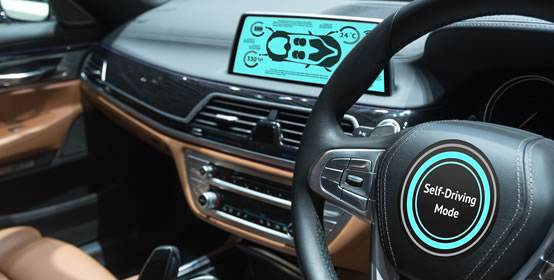
The technology fueling the race to build and mass produce self-driving cars is accelerating at such incredible rates that President Trump plans to announce plans to regulate the industry in the near future. Some of the country’s best companies, like Apple, GM, Honda and Toyota among others, have been working overtime to create the necessary conditions for an autonomous vehicle revolution. Legislation allowing test runs of these vehicles has already been passed in some states, and the future quite literally is now.
Top tech-innovator Apple has been very interested in creating software capable of complex tasks like controlling and maintaining a driverless vehicle. This month, Tim Cook, Apple’s chief executive, publicly announced Apple’s involvement in developing such tech. He believes that the endeavor is the “mother of all AI projects.” Their interest is less in the self-driving car itself and more in the development of a number of autonomous systems. The company has reportedly tried to partner with different automobile manufacturers, but has yet to successfully close a deal. Many are speculating that Apple may be trying to create their own car. Apple has yet to release too many details about their ongoing efforts.
General Motors has expressed extreme interest in pursuing a future full of self-driving cars. Just this month, the company publicized its accomplishment in creating a line of autonomous Chevrolet Bolt vehicles. Chairman and CEO Mary Barra stated that her company is the only automaker capable of mass-produce autonomous vehicles. She explains that “no other company today has the unique and necessary combination of technology, engineering and manufacturing ability to build autonomous vehicles at scale.” Barra is not exaggerating. While Apple and Google have the autonomous car technology software, GM can manufacture the automobile necessary for marketing this upcoming trend. The cars have been through rigorous testing over the past year, and the new Chevrolet Bolt is the company’s second generation of self-driving vehicles. The model’s recognizable features include a roof rack with modules and cameras, white radar units mounted on the sides and traffic light cameras.
Despite being late to the race, Honda’s automated vehicle technology will easily compete with the likes of Apple’s future vehicles. Honda’s project was given a major boost when the company teamed up with Alphabet’s self-driving division, Waymo. Waymo is utilizing and improving upon Honda’s already established technology and combining it with their software to create a completely autonomous vehicle by 2025. Another project partnership working on self-driving cars is Jaguar and Lyft. Jaguar recently invested $25 million and a fleet of vehicles to Lyft in an attempt to begin testing autonomous Jaguar Land Rovers (https://www.engadget.com/2017/06/12/lyft-teams-up-with-jaguar-to-test-autonomous-cars/).
The incredible technological advancements and successful tests involving autonomous cars have launched an effort to legislate the future trend. Without approval, these types of cars wouldn’t be approved for use on traditional highways. On June 13, three senators published a list of principles needed to govern the future revolution. Senators John Thune, Bill Nelson and Gary Peters argue a need for prioritizing safety, remaining tech neutral, strengthening cybersecurity, reinforcing government roles and promoting innovation should be the goals in drawing up laws in this area. According to Reuters, President Trump and transportation secretary Elaine Chao plan on announcing new self-driving car regulations very soon. As it stands, 17 states have already put in place their own legislation. The state of New York, for example, recently gave permission for Audi to test their vehicles in limited areas.
The technology behind self-driving cars, once perfected, will save lives and money by reducing the amount of accidents on the road. Human error, according to a large study conducted by Intel, accounts for 95 percent of car accidents. Intel found that we can expect such technology to save around 600,000 lives in the decade between 2035 and 2045.
One major question that remains to be seen is whether such a revolution will end private car ownership. The model of the future may be more ride-sharing or beckoning of a robot car when needed rather than owning your own vehicle. Some believe that driverless technology can be combined with electric vehicles and reduce the need for any driving fees. The potential environmental impact of a societal shift from private car ownership to this model will encourage more socially conscious people to support driverless car services.
Intel experts predict that the driverless car market will exceed over $7 trillion annually by the year 2025. With some of the most innovative companies like Apple, Google and GM focused on this endeavor, we should expect to see this product revolutionize the way we live. The potential to save lives, money and the environment have inspired Congress and President Trump to consider legislating and promoting the coming revolution.